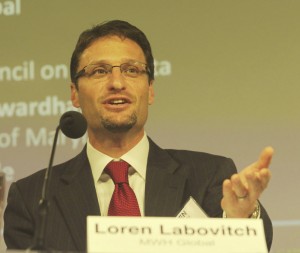Loren Labovitch, director of emerging market growth
 Early in November, I had the opportunity to speak at the Notre Dame Global Adaptation Index (ND-GAIN) annual meeting in Washington, D.C. The yearly gathering brings together thought leaders from the private, public and non-profit sectors to discuss the latest efforts by companies, policy makers, academic institutions and others to enhance the world’s understanding of climate risks and opportunities and help mobilize greater investment in climate resilience and preparedness.
Early in November, I had the opportunity to speak at the Notre Dame Global Adaptation Index (ND-GAIN) annual meeting in Washington, D.C. The yearly gathering brings together thought leaders from the private, public and non-profit sectors to discuss the latest efforts by companies, policy makers, academic institutions and others to enhance the world’s understanding of climate risks and opportunities and help mobilize greater investment in climate resilience and preparedness.
The ND-GAIN Index is an open source tool that aggregates over 15 years of data across 50 variables to rank countries based on how vulnerable the country is to climate change and how ready the country is to implement successful adaptation solutions. The index, which is updated annually, helps decision makers better understand and prioritize what types of interventions will improve a country’s ability to respond to the effects of a changing climate. Joyce Coffee, the managing director of ND-GAIN, is a former MWH employee.
I participated on a panel discussing the importance of measuring adaptation to inform decision making. As part of the discussion, I highlighted the work that MWH does to help cities and other global public and private clients better manage their water, wastewater and energy assets, and improve the stewardship of natural resources, all of which are important factors in reducing vulnerability to natural disasters and climate change. Recognizing that addressing climate change involves a wide range of environmental, social and economic considerations, I emphasized that MWH strives to provide clients with holistic solutions that take into account not only physical outputs but also longer term environmental and societal outcomes. In this regard, we discussed the importance of using downscaled data at the community and/or watershed (landscape) level to inform the design, implementation and monitoring of community resilience strategies and to help community leaders develop effective risk management frameworks for measuring the effectiveness of these strategies over time.
Joining me at the event were other leaders from IBM, Entergy, EY, AECOM, Inter-American Development Bank, USAID, the Wilson Center, University of Maryland, and the University of Notre Dame, among others. Anne Thompson, chief environmental affairs correspondent for NBC News, provided an informative and passionate keynote address. The breadth of different perspectives contributing to the discussion reflected the need for collaborative, multi-disciplinary approaches for managing climate-related risks and highlighted a range of new and innovative thinking among global thought leaders. New financing strategies for protecting and restoring ‘natural capital’ and emerging trends in the use of big data, social media, and crowd sourcing tools were among the most compelling presentations. In light of increasing urbanization and significant infrastructure needs globally, there was also considerable discussion about how to design and finance more sustainable and resilient cities, with water security and flood management among the primary concerns in this regard.
Prior to the annual meeting in November, I was also invited to be part of a panel of experts that selected the recipients of ND-GAIN’s annual corporate adaptation prize, which recognizes multinational and local organizations that make measurable contributions to climate change adaptation in the world’s most vulnerable countries. I spoke at an event in New York City in connection with Climate Week NYC and the United Nations Climate Summit honoring this year’s recipients, which included Novartis International AG and the Centre de Suivi Ecologigue (CSE).
